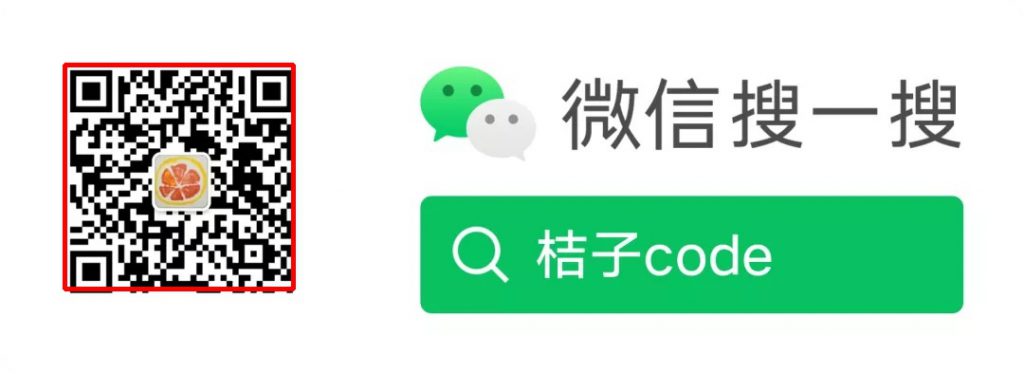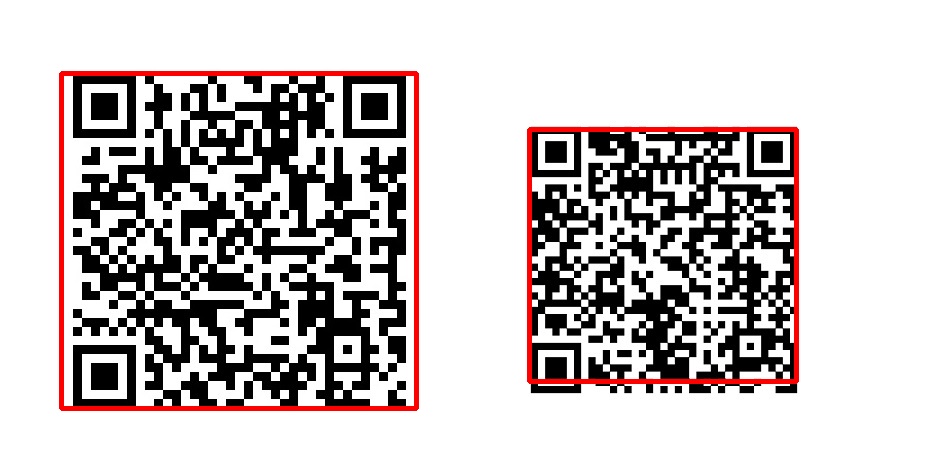原文链接:http://www.juzicode.com/opencv-note-wechat-qrcode-detect-decode
微信开发团队在今年年初的时候将其二维码扫描功能贡献给了OpenCV社区,在OpenCV-Python中也可以使用微信扫码功能了。
使用前需要安装opencv-contrib-python包,注意安装的包不能低于4.5.2版本。
使用起来也非常简单,近乎一行流的风格,首先是用wechat_qrcode_WeChatQRCode()创建检测实例,再用detectAndDecode()检测和识别:
#VX公众号: 桔子code / juzicode.com
import cv2
print('cv2.__version__:',cv2.__version__)
detect_obj = cv2.wechat_qrcode_WeChatQRCode()
img = cv2.imread('pic/qr.jpg')
res,points = detect_obj.detectAndDecode(img)
print('res:',res)
print('points:',points)运行结果:
cv2.__version__: 4.5.3
res: ['http://weixin.qq.com/r/Ejr54d-EkYLurZuC928A']
points: [array([[ 0., 0.],
[1079., 0.],
[1079., 393.],
[ 0., 393.]], dtype=float32)]返回的结果包含了2个参数,第一个为识别到的二维码信息,第2个为二维码的位置点,二者都是list类型。
我们可以像 QRCodeDetector识别二维码 一文中那样用points标注出二维码的位置:
for pos in points:
color=(0,0,255)
thick=3
for p in [(0,1),(1,2),(2,3),(3,0)]:
start = int(pos[p[0]][0]),int(pos[p[0]][1])
end = int(pos[p[1]][0]),int(pos[p[1]][1])
cv2.line(img,start,end,color,thick)
cv2.imshow('img',img)
cv2.imwrite('wechat-qrcode-detect-1.jpg',img)
cv2.waitKey()
cv2.destroyAllWindows()
但是这个时候看到检测到的二维码位置是错误的,那是因为在创建检测实例的时候没有传入模型文件导致的,为了更好的检测精度和检测效果,应该在创建实例的时候传入模型文件,模型文件可以在https://github.com/WeChatCV/opencv_3rdparty/tree/wechat_qrcode 下载到,该链接包含了4个模型文件。

下面的例子是在wechat_qrcode_WeChatQRCode()创建实例的时候传入4个模型文件,注意根据入参名称确定4个模型文件的顺序:
cv2.wechat_qrcode_WeChatQRCode( [, detector_prototxt_path[, detector_caffe_model_path[, super_resolution_prototxt_path[, super_resolution_caffe_model_path]]]] )
#VX公众号: 桔子code / juzicode.com
import cv2
print('cv2.__version__:',cv2.__version__)
detect_obj = cv2.wechat_qrcode_WeChatQRCode('detect.prototxt','detect.caffemodel','sr.prototxt','sr.caffemodel')
img = cv2.imread('pic/qr.jpg')
res,points = detect_obj.detectAndDecode(img)
print('res:',res)
print('points:',points)
for pos in points:
color=(0,0,255)
thick=3
for p in [(0,1),(1,2),(2,3),(3,0)]:
start = int(pos[p[0]][0]),int(pos[p[0]][1])
end = int(pos[p[1]][0]),int(pos[p[1]][1])
cv2.line(img,start,end,color,thick)
cv2.imshow('img',img)
cv2.imwrite('wechat-qrcode-detect.jpg',img)
cv2.waitKey()
cv2.destroyAllWindows()运行结果:
cv2.__version__: 4.5.3
res: ['http://weixin.qq.com/r/Ejr54d-EkYLurZuC928A']
points: [array([[ 68.91869, 68.94066],
[309.48257, 68.94066],
[309.48257, 304.46286],
[ 68.91869, 304.46286]], dtype=float32)]
从这里可以看到识别到二维码的位置就更精确了。
下面是一张图片中包含多个二维码的情况:
#VX公众号: 桔子code / juzicode.com
import cv2
detect_obj = cv2.wechat_qrcode_WeChatQRCode('detect.prototxt','detect.caffemodel','sr.prototxt','sr.caffemodel')
img = cv2.imread('pic/qr-multi.jpg')
res,points = detect_obj.detectAndDecode(img)
print('res:',res)
print('points:',points)
for pos in points:
color=(0,0,255)
thick=3
for p in [(0,1),(1,2),(2,3),(3,0)]:
start = int(pos[p[0]][0]),int(pos[p[0]][1])
end = int(pos[p[1]][0]),int(pos[p[1]][1])
cv2.line(img,start,end,color,thick)
cv2.imshow('img',img)
cv2.imwrite('wechat-qrcode-detect-multi.jpg',img)
cv2.waitKey()
cv2.destroyAllWindows()运行结果:
cv2.__version__: 4.5.3
res: ['this is a test image', 'www.juzicode.com vx: juzicode']
points: [array([[529.5263 , 129.34688],
[796.45605, 129.34688],
[796.45605, 381.95035],
[529.5263 , 381.95035]], dtype=float32), array([[ 61.99477, 73.86028],
[416.3537 , 73.86028],
[416.3537 , 408.76263],
[ 61.99477, 408.76263]], dtype=float32)]
当不加载模型文件时,如果图像中包含了多个二维码,就只能识别到其中1个:
#VX公众号: 桔子code / juzicode.com
import cv2
detect_obj = cv2.wechat_qrcode_WeChatQRCode()#'detect.prototxt','detect.caffemodel','sr.prototxt','sr.caffemodel'
img = cv2.imread('pic/qr-multi.jpg')
res,points = detect_obj.detectAndDecode(img)
print('res:',res)
print('points:',points)运行结果:
cv2.__version__: 4.5.3
res: ['this is a test image']
points: [array([[ 0., 0.],
[937., 0.],
[937., 465.],
[ 0., 465.]], dtype=float32)]下面我们来看一下现实场景中的识别效果,从摄像头获取图像并进行解析:
#VX公众号: 桔子code / juzicode.com
import cv2
print('cv2.__version__:',cv2.__version__)
detect_obj = cv2.wechat_qrcode_WeChatQRCode('detect.prototxt','detect.caffemodel','sr.prototxt','sr.caffemodel')
cap = cv2.VideoCapture(0)
while cap.isOpened():
ret, img = cap.read()
if ret is not True:
print("读取失败退出")
break
res,points = detect_obj.detectAndDecode(img)
print('res:',res)
print('points:',points)
for pos in points:
color=(0,0,255)
thick=3
for p in [(0,1),(1,2),(2,3),(3,0)]:
start = int(pos[p[0]][0]),int(pos[p[0]][1])
end = int(pos[p[1]][0]),int(pos[p[1]][1])
cv2.line(img,start,end,color,thick)
cv2.imshow('img',img)
#检查按键
key = cv2.waitKey(200) & 0xff
if key == ord('q') or key == ord('Q') :
break
cap.release()
cv2.destroyAllWindows()opencv微信识别二维码: